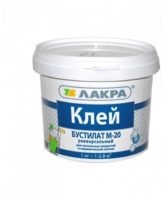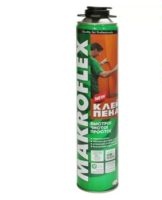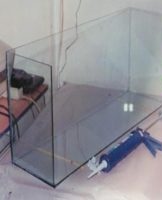What is the best glue for bathroom tiles, criteria and features
The walls in the bathroom are most often covered with tiles, for the installation of which special adhesive solutions are used. When choosing the best one to buy bathroom tile adhesive, it is recommended that you familiarize yourself with all the popular varieties and options. By comparing different samples, you will be able to determine the choice based on your own preferences.
Main varieties
Depending on the composition and consistency, there are several types of tile adhesive. Each option has individual features and characteristics.
containing cement
Most cementitious adhesives are available in powder form. Washed and crushed quartz and dolomite fillers are used as the main components.The presence of plasticizers in the composition increases adhesion and resistance to moisture.
acrylic dispersions
Acrylic dispersion glue is a ready-to-use compound based on a dispersion of synthetic resins. The main characteristics of acrylic dispersions are increased elasticity and the ability to operate in the operating temperature range from -30 to +90 degrees. Acrylic dispersions are versatile and suitable for tiling all types of substrates including concrete, cement, plaster, plasterboard and other surfaces.
Epoxy mortars
Epoxy glue is a synthetic product created by combining epoxy resin and minor substances. Additional components include solvents, plasticizers, hardeners and fillers.
The solution forms an inseparable bond, which is why it is actively used for finishing work in the bathroom.
Marking characteristics
Manufacturers of adhesive solutions mark products in accordance with EN 12004. The presence of marks on the packaging indicates high quality and compliance with the specified characteristics, so it is important to pay attention to this parameter when purchasing. The following brands of tile adhesive stand out from European manufacturers:
- C1 and C2 - cementitious adhesive with basic or reinforced adhesion to the surface. One of the options must be chosen depending on the base type.
- R - a group of reactive solutions with increased elasticity and adhesion. These glues do not contain cement or water.
- F - fast-hardening mortars, the use of which can reduce the duration of finishing works. This option is relevant when working with tiles with high water absorption.
- T is the trademark for thixotropic adhesive. A distinctive feature is the ability to hold the tiles on a vertical surface without the risk of slipping under the weight of their weight.
- E - parameter characterizing the increase in the open time of the solution. This indicator determines how long the applied solution retains its adhesion and adhesion properties.
- S1 and S2 are the index of elasticity to be paid attention to when finishing the substrate under vibration load.
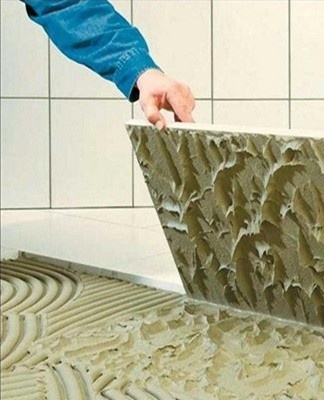
How to choose the right tile adhesive
When buying tile adhesive in the bathroom, you need to adhere to an integrated approach. To choose the right variety, you will need to take into account a number of parameters.
Base type
Certain types of tile are more firmly attached to cement, brick and other substrates. To ensure proper adhesion, you must purchase an adhesive solution designed for the specific substrate.
Tile Features
The back of the tile can be textured or smooth, which determines the appropriate glue and strength of adhesion to the surface. For this reason, it is recommended that you first purchase a tile and familiarize yourself with its specifics, and then research the desired adhesive solution.
Place of installation
The decoration of the bathroom is often performed not only on the walls, but also on the ceiling. For laying tiles on horizontal surfaces, an adhesive with increased adhesion is required, otherwise it will peel off from the substrate over time.
Special properties
When buying an adhesive solution, you should pay attention to its special properties. These characteristics include increased adhesion, the need for preparation before application to the surface, speed of hardening and others.
Availability of auxiliary heating
If you plan to install additional heating elements in the bathroom, you should take this into account when choosing a tile adhesive.
The mortar must be sufficiently resistant to high temperatures and not peel off the surface.
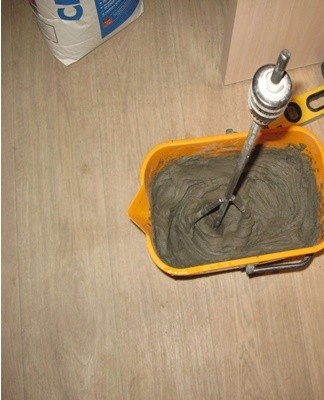
Color
Since part of the solution can get into the gap between the tiles, you need to choose a neutral colored glue. Better to opt for a transparent glue that can be hidden with grout.
Ease of installation
The building materials market offers several options for tile adhesive, which differ in the form of release. There are ready-to-use solutions and those that need to be dissolved in water.
In addition, the setting speed affects the ease of installation.
Conditional division into groups
All types of glue are conventionally divided into a number of groups. Each of them has distinctive features.
The first one
The first group includes dry mixes. To use them, you must first add water.
The second
The second group includes solutions with the addition of natural resins. They freeze slowly, which makes it easier for beginners to work.
The third
The third group includes epoxy solutions. They harden quickly and are characterized by low plasticity.
Fourth
This group consists of thick layer mixtures. Such solutions make it possible to create a layer of up to 25 mm between the base and the tile.
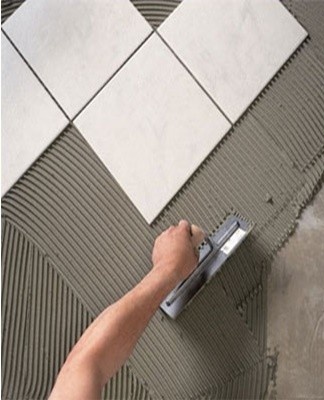
The fifth
The range of the fifth group includes fungicide solutions. The ingredients are additives that prevent the formation of fungi.
Rating and opinion of the best manufacturers
When choosing a tile adhesive, you should familiarize yourself with the rating of the best manufacturers. This will prevent you from buying poor quality products.
MAPEI S.p.A.
The Italian company produces a wide variety of modifications of tile adhesives. Products are appreciated for their high quality and variability of choice.
Litokol
Litocol's production facilities ensure that the dosage of each adhesive component is precise. The product catalog offers solutions for various substrates.
weber saint gobain
The company produces dry building mixtures. Advanced technologies make it possible to create high-quality tile adhesive.
HENKEL-Ceresit
The manufacturer occupies one of the leading positions thanks to its innovative approach. When creating building materials, modern solutions and technologies are used.
KNAUF
KNAUF tile adhesive is suitable for a variety of interior applications. The mixes are supplied dry and mixed with water.
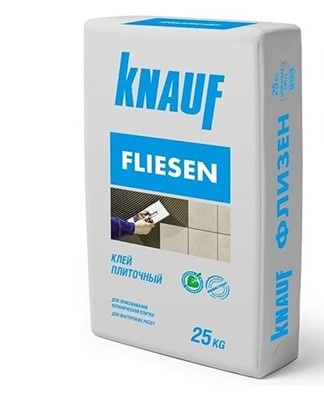
Volma
Glue "Volma" belongs to the category of particularly plastic and high-strength materials. The mortar is suitable for all types of tiles.
IVSIL
IVSIL assembly glues are produced in different versions, which makes it possible to choose for any type of support. Dry mixes are created using modern technologies.
GLIMS
The advantages of Glims glue are environmental friendliness, resistance to moisture and high temperatures. The mortar is suitable for laying any type of tile.
"BOLARS"
Bolars is an adhesive for laying tiles on walls and floors. Products are used in rooms with high and normal humidity.
"Prospectors"
Solutions of the "Starateli" brand are designed for laying ceramic tiles in bathrooms without heating. The adhesive is used on durable non-deformable substrates.
Ceresit
Ceresit glue based on cement and mineral aggregates. The main advantages are a wide range of applications and high performance characteristics.
"Eunice"
Unis products are recommended for complex tasks. For example, for underfloor heating and laying on an old layer of tiles.
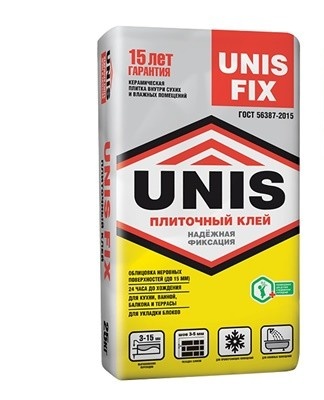
"Typhoon"
The peculiarity of Typhoon glue is that it can be used for leveling walls. The mortar eliminates micro-cracks and fixes the tiles securely.
Vetonite
The manufacturer Vetonit produces dry building mixtures. The product range includes solutions for standard and complex applications.
Sopro
The German manufacturer Sopro produces several types of glues. The most requested are:
- Sopro 1 is a dry, highly elastic mix used for laying ceramic tiles. This option has a long open time and improved adhesion to the surface.
- Sopro ff 450 is a hydro-binding and elastic adhesive with reinforcing fibers in the structure. Due to its special composition, the dried mortar reliably fixes the tiles to the bases and prevents slipping. Additional advantages include frost resistance, high adhesion and suitable quality.
"Kreps"
Kreps products are suitable for laying ceramic tiles, porcelain stoneware and stone products. Solutions of this brand are also used for laying on heated floors.
Additional tips and tricks
The main recommendation when choosing an adhesive is to take into account the type of support and the tile itself. These indicators are essential and affect the quality of the bathroom finish.

